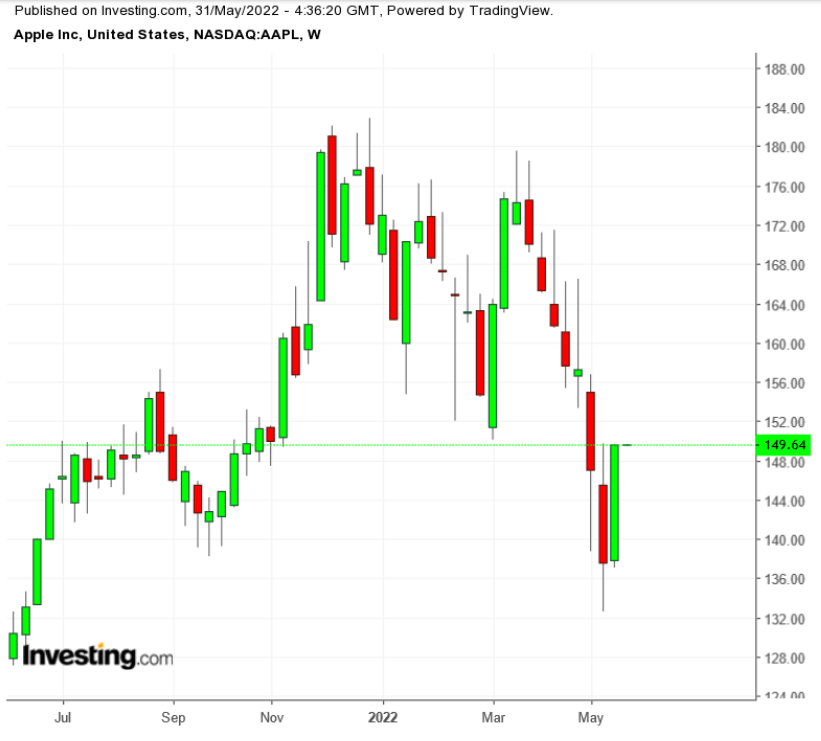Apple offers a unique combination to boost the total return in the shape of capital growth, dividends, and a share buyback plan
Warren Buffett has built a $159-billion stake in Apple to benefit from the company’s unique growth prospects
Apple is betting on resilient demand for its devices due to its comparatively wealthier customer base and the strength of its software and services ecosystem
If you’re interested in upgrading your search for new investing ideas, check out InvestingPro+
If your investment goal is to build a portfolio which could produce sustainable income during retirement, then it makes sense to look for blue-chip companies that have strong balance sheets, dependable dividends, and a history of hiking their payouts.
A portfolio built on such stocks will most likely be able to weather recessions, resist inflationary pressures, and endure through price bubbles which often occur in the aftermath of relaxed monetary policies.
Companies that offer reliable and predictable dividends, as well as long-term growth potential, can help provide income no matter how rough the market waters get.
Since it’s a growth stock, Apple (NASDAQ:AAPL) is generally not considered a good fit for retirement portfolios. And unlike the market’s defensive areas—such as utilities, telecom and consumer staples—shares of the iPhone maker have limited appeal as an income producer for retirees given the stock’s meager 0.6% dividend yield. Plus, its status as a technology company makes it a member of a highly volatile segment of the market that retirees often avoid.
Yet, despite these disadvantages, there’s still a strong case to be made for Apple as part of a diversified retirement portfolio.
 AAPL Weekly TTM
AAPL Weekly TTM
Apple, in our view, offers a unique combination of benefits in the shape of capital growth, increasing dividends, and a massive share buyback plan—all of which could boost an investor’s total return. While Apple has been increasing its dividend 10% on average during the past five years, it has also been buying back its shares, providing additional value to stakeholders.
Apple authorized $90 billion in share buybacks last quarter, after spending $88.3 billion on buybacks in 2021, the biggest outlay among listed companies in the US. Long-term, buy-and-hold investors love repurchase programs as they reduce a company’s share count and lift earnings, especially during turbulent times such as what we’re now facing.
Warren Buffett’s Love for Apple
Renowned investor Warren Buffett, whose holding company Berkshire Hathaway (NYSE:BRKa) is one of the largest shareholders of Apple, has benefited immensely from this trend. Buffett has built a $159-billion stake in Apple since Berkshire Hathaway started buying the stock in late 2016.
The 91-year-old investor is a fan of CEO Tim Cook’s stock buyback strategy because it gives Berkshire increased ownership of each dollar of the smartphone and computer company’s earnings each year. During the BRK shareholder meeting in April Buffett said:
″…[W]e knew that we would own an even greater interest if they kept buying their shares, which we didn’t have any insider information or anything but certainly would seem the way to bet. They just reported their March quarter and, you know, they earned more money and they had fewer shares outstanding.”
With about $200 billion in cash on hand, Apple is in an enviable position of easily being able to further increase its share repurchase program in order to support its stock.
Its focus on the cash-return program doesn’t mean that Apple is lacking in innovation and new ideas. Apple continues to have a lot of potential to surprise The Street despite the current challenging operating environment in which supply-chain disruptions are hurting its manufacturing in China.
The Cupertino, California-based company is betting on resilient demand for its devices due to its comparatively wealthier customer base and the strength of its software and services ecosystem which is fueling sales of hardware, Bloomberg reported this month.
AAPL is also seeing less competition now that fierce rival Huawei Technologies has been shut out of markets. Huawei, once the No. 1 phone maker by shipments, has seen revenue fall for six consecutive quarters.
Bottom Line
At a time when investors are increasingly concerned about the economy and the performance of high-growth shares, Apple is a defensive stock that is well-positioned to weather a possible downturn. Now more than ever, it makes sense to treat Apple as a retirement stock that’s ideal for buy-and-hold investors.
***
Interested in finding your next great stock idea? InvestingPro+ gives you the chance to screen through 135K+ stocks to find the fastest growing or most undervalued stocks in the world, with professional data, tools, and insights. Learn More »
Source: Investing.com





























